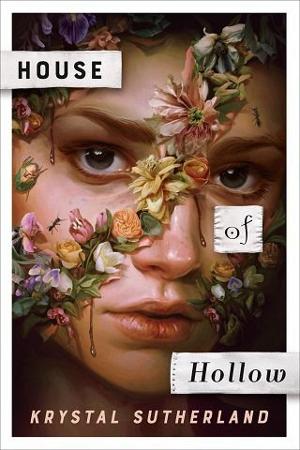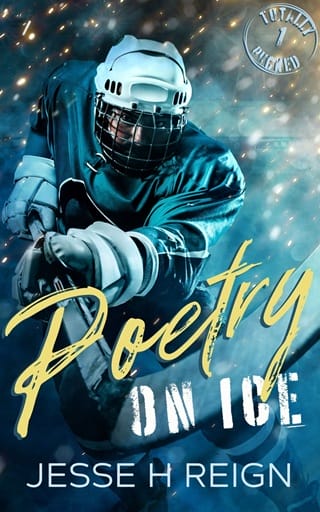Chapter 18
18
I was seventhe first time I slipped from the land of the living to the land of the dead.
The second time, I was seventeen.
I stepped through a broken doorway that once went somewhere, and then went somewhere else.
The first change I sensed was the smell. Somewhere between one inhale and the next, the air became tainted. The clean scent of Edinburgh—grass and sea and stone—was usurped by smoke and wild animal and rot.
We stepped from dawn to dusk.
From cold to humidity.
From ruins in Scotland to ruins . . . elsewhere.
I blinked a few times and tried to get my vision to adjust. My stomach turned, an untethered sac inside me. I tasted fat and metal. My skin fizzed, prickling with the remnants of whatever violent energy had brought us here against the rules of nature, living things transported to a dead place. Tyler was already bent double, elbows on his knees, the contents of his stomach leaking from his mouth and nose in a sour waterfall.
We were in a dying forest. Hazy light filtered through the wiry canopy to the ground below, which was covered with long grass, rotting leaves, and white petals. Tyler groaned and sank to his hands and knees, then vomited some more, flecks of it splashing over his fingers. I stumbled away to keep from puking myself, feeling hungover and shaky. I squatted and cupped my hands over my mouth and tried to take deep breaths to weaken my nausea, but the pain in my chest kept sparking with every inhale.
“God,” Tyler said as he crawled away from his vomit and collapsed onto his back in the grass. “Dorothy and Alice and the Pevensie children didn’t suffer like this.”
I couldn’t help myself. “I didn’t know you could read,” I said through my fingers. My stomach tightened and my vision jittered like I was drunk, but the sick burn was almost worth it.
“You would kick me when I’m down?” Tyler said, almost in a whisper.
I peeled my fingers away from my face and forced myself to take a deep, fetid breath.
“Why do I feel so god-awful?” Tyler dry heaved a few times. “And why does it stink so badly?”
It did stink. It stank of rot and smoke, each breath sticky yellow on my tongue. It stank of my worst memories and worst nightmares come to life. I knew this smell, because I had been here before.
The Halfway.
“It’s putrid,” I said. “It’s a slowly rotting canker somewhere between the realms of life and death.” A decaying tooth, lodged deep at the back of the mouth. A gangrenous limb, turned swollen and black from a lack of blood supply. A dying thing, soft and bloated and bleeding, but still attached by thin threads to our living world.
The forest around us was thick but decomposing and misshapen, stuck in a perpetual state of decay. The tree closest to me was soft with rot, its roots arthritic, its trunk split open and oozing what looked very much like pus. A threadbare smattering of leaves still sprouted from its sagging branches, but they grew gray and moldy, and when they fell, they landed in blighted fens on the forest floor.
Above, the sky was flush with gunmetal light. Vivi had said that in Grey’s stories, the sun never set in this place, nor did it rise. The sky here was jammed halfway, always on the precipice of dusk. The shadows were always stretched and sunken, full of twilight things.
The wood was sick. The wood was angry. It did not feel welcoming.
There was a low moan of faraway wailing in the air, something that sounded almost human but not quite. For a moment, I thought it was the trees, whispering to each other. The ruins of Saint Anthony’s chapel looked almost the same here as they had in Holyrood Park, still a freestanding church wall of harsh hewn stone, except here they were in a forest and were covered in dollops of mold and carrion flowers. Through the door, I could see only more hazy woods.
We had fallen through a crack in the world.
Thisis where we had come as children and wandered for a month. A place of the dead. What had happened to us here? Why had we stayed so long?
“How can a place be dying?” Tyler asked, but I wasn’t watching him. I was looking at his vomit. It had started sprouting flowers. How long would it be before this place crawled inside him and started nesting?
“Oh shit,” Tyler said, his gaze set on something behind me. He sat up and grappled with Agnes’s shotgun as I spun around. There was a pale man standing in the trees not far away. Dead-eyed and sightless, a slick of dark gloss where his irises should be. Runnels of liquid leaked from his orifices: his mouth, his nose, his eyes, his ears. He was naked and his skin was thick with a garden of green and white lichen.
There were clusters of others behind him. At first I thought they were statues, effigies in the shapes of men and women, sitting in tree roots, standing in the long grass. They reminded me of the death casts of the victims of Pompeii, all captured in moments of movement that had, very suddenly, ceased. The Halfway had grown on them, in them, had pulled them apart from the inside out. Some were so fresh they had fabric decaying on their bodies, and a few still smelled like people: of sweat and oil and the sharp tang of urine. Others were much older, and so misshapen it was hard to tell they’d once been human apart from the teeth and nails and clumps of hair erupting from knots of wood.
“What are they all doing?” Tyler asked.
“I think they’re drawn here by the door.” All of them were facing toward it; some were even reaching out to it. “Agnes said the veil is thinnest at sunset and sunrise and that sometimes the dead whisper to the living. Maybe it goes both ways. Maybe they can hear and smell life, but they can’t cross over, so they wait here—forever.”
“They’re all dead?” Tyler whispered.
I approached the closest man and moved my hand in front of his face. Something registered beneath the dark veneer of his eyeballs, and his black irises slid in my direction. Though his body had ossified and his skin had the texture of rough-hewn stone, there was still something locked away inside him. “They’re whatever is left over after a person dies.” I looked around the wood once more, understanding: Agnes had said that everything that dies passed through here.
These people were ghosts, as were the trees. Everything here had lived, once, in our world and gotten stuck here in the Halfway after they died.
I set off into the forest, weaving through the sea of frozen spirits. “Try not to wake them,” I said to Tyler.
“Do you think all the dead are here?” he asked quietly as he trailed me. “Do you think Rosie is here?”
“Everything that dies passes through—but only those who can’t let go get stuck.”
“Part of me hopes she’s here. So I can . . . see her. Say sorry. If I could just see her one more time . . .”
I wanted to say: “Don’t hope for that fate for her.” But I said nothing. If Grey or Vivi died, I would want to see them again.
“Do you hear that?” Tyler asked. “Running water.”
We followed the sound over a small rise and found a milky green river bordered on both sides by brushwood and dead weeping willows that drooped like tangled hair into the water. The water moved quickly and was swollen with bodies that drifted along with the current. Men. Women. Children. All of them naked. All of them with wide black eyes.
A river of the dead.
“Oh God,” Tyler said as he gagged.
“We should move quickly,” I said as I stared at the flowing water. “We shouldn’t stay here. Get in, get my sisters, get out. I can feel them.” I’d felt them since the moment we stepped through. Grey and Vivi’s presence was stronger here. Not close, but tangible at least, a ropy tug around my heart. My sisters had been here before—and so had I. Not to this exact part of the afterlife, but here. All I had to do was let my feet carry me to them.
“This seemed like such a good and noble idea ten minutes ago,” Tyler said. “I forgot that I’m not a good or noble person.”
My sickness was fading now, replaced piece by piece by the thrill of our plan having worked. We were here. We had done it. And there, seeded beneath the excitement, was something else: the sense of familiarity.
The answers to long-asked questions felt suddenly possible.
“Let’s go,” I said. When I started walking, I knew it was in the right direction.
Toward my sisters. Toward some answers.
We walked for what felt like an hour through the wood. Or was it two hours? Time moved strangely here. Dusk continued to fall and fall and fall, but night never came. Tyler complained about the smell and the damp and the throbbing pain in his face and the destruction of his expensive clothing until I told him to shut up, please, for the love of God, shut up. The pain in the side of my chest nagged at me, a needle pricking against my lungs anytime I breathed too deeply. The rest of my body was covered with slow aches that crept in and nestled in all the bruised parts of me, making their homes there, throbbing in time with my heartbeat.
For a time, we saw other doors, all freestanding and half-ruined, held up by nothing. Stone archways and burned timber, doorways back to desolated parts of our world. Around each of them we found clusters of spirits turned to wood and stone, things that had once been human but were now only memories. I wondered about the people they had been before their souls had gotten snagged here on the way to death. What did they long for so badly that they had been unable to let go? Love? Power? Money? The chance to say sorry?
It was near one of these doors that I spotted the first swatch of fabric: a torn strip of red-and-black tartan, tied around a low tree branch. I stumbled toward it. Despite a few spots of mold, it looked out of place against the forest: red and man-made where everything else was green and gray.
“I know this pattern,” I said as I rubbed it between my fingers. I thought back to the photograph I’d found in Cate’s bedside drawer what seemed like a lifetime ago now but was really only a week. “I was wearing this coat when I went missing.”
“I can see your terrible taste in clothing hasn’t changed in over a decade” was Tyler’s contribution to the discovery. “What are you doing?” he said as I weaved through the trees and the statues of the dead, moving outward in a circular pattern, looking for another flash of red.
“Testing a theory,” I said.
“Well, I’m sitting,” he said.
A few minutes later, I spotted what I was looking for and grinned. I went back to Tyler—who was, indeed, sitting cross-legged on the ground—and pointed through the trees. “There,” I said. “Do you see it?”
“More decomposing forest? Oh, yay.”
I smacked him gently across the back of the head. “Look harder.”
“Another one?” Tyler asked. Just visible in the distance through the trees was another strip of red fabric, hanging limply. “So what?”
“Bread crumbs,” I said breathlessly, giddy with the thrill of the clue. I moved toward the next strip of fabric as fast as my broken ribs would let me. “Don’t you get it? We came this way as children, and we left bread crumbs to find our way—”
My next step did not find ground but air and I suddenly found myself tumbling through mud and forest, down a slope, until I came to lie faceup in an inch of fetid water.
“Are you alive?” Tyler called from somewhere above.
All I could do was let out a low moan. Pain cascaded through my side and wrapped tight around my lungs. I heard him sigh and start to make his way down the bank.
“Can I leave you behind if you die or do you expect me to be heroic and drag your corpse home?” Tyler asked.
It took him a few minutes to reach me, which suited me fine, because I had no desire to move. I lay in the water, drawing shallow breaths as I waited for the pain to ebb. Eventually, the sting in my bones loosened enough that I could prop myself up on one elbow to see where I was.
“Oh,” I whispered. The water I’d fallen into was black and smooth as glass. Distended bodies floated on its surface for as far as I could see. They paid me no mind. When Tyler slid down the bank, they blinked open their black eyes and watched him, but they didn’t come crawling from the water to attack us.
“Well, we are obviously not going in there,” Tyler said as he reached me and helped me stand, then turned to scrabble his way back up the bank. Drowned trees grew out of the water, bone pale and stripped bare of leaves. It was a marshland of some sort, a dead place inside a dead place.
“Wait,” I said. I pointed to what I wanted Tyler to see: another red-and-black way marker called us deeper into the fen.
“No,” he said as I took a step into the water. “No.”
Eventually, of course, he followed. There was only one thing more frightening than wading into a swamp of the dead, and that was being on your own in this place. Our feet sank into the ankle-deep water and mush as we trudged over spongy ground. Here, the tree branches sagged into the shallows, making the terrain hard to traverse. It seemed darker in this part of the forest. The trees seemed wilder. The going was slow. Things moved around us, unseen. Bodies bobbed by, eyes flicking open like lamps as we passed. We abandoned our coats to the marsh; they were too heavy to carry. I tucked Grey’s knife into my bra and folded my jeans up to keep them out of the water.
We came across more ruins sunk into the marshland. Not doorways now, but low stone walls ground down to hip height by age. The bricks that made them were crumbling into the moor, greedily devoured by hungry tree roots. Soon we began to see other structures, tumbledown stone houses that were infected with lichen, their windows smashed and trees bursting from their roofs. Many were surrounded by decaying stone walls. I’d seen a documentary on ghost towns once, about how nature slowly reclaims signs of human habitation and leaves only eerie remnants behind. Roads eaten through by vegetation. Unkempt buildings withered by sun and wind. Concrete dissolved by rain, terra-cotta red roofs caked in grime. That was nothing compared to the utter desolation of these ghost houses. The forest crept in and around them, tearing them apart, but they also rotted from inside, sagging into the water, their walls collapsing into soft masses of putrefaction. And in each one, the spirits of the dead drifted from room to room, window to window, unable to let go or move on.
The hours bled together. There was no sunrise, no sunset, no time. We walked until our legs ached and we began to drift into sleep standing up. I hadn’t eaten since Vivi brought me breakfast the morning before and my hunger was a chasm inside me. We steered clear of the empty shells of houses, cautious of what we might find inside. We followed the tartan way markers deep into the marsh, where the water was hip-deep and so dark I couldn’t see my fingers in it if I submerged them. Fog curled across its surface, squeezing our visibility to no more than six feet.
Bodies drifted everywhere. The twisted skeletons of dead things floated by. I lifted the skull of a bull from the water and stared into the hollows where its eyes should be.
And then the fog curled back like a curtain to reveal her.
A child sat cross-legged and naked on a low mud island, her dark hair stuck to her back in wet curlicues. Tyler and I both stopped when we saw her through the haze, afraid of catching her attention, but she already seemed to have heard us and half turned her head in our direction. She was sweet-faced and very young, perhaps only six or seven. I could see webs of veins beneath her sodden flesh. Her black eyes reminded me of spider eyes. There was mud and reeds matted into her hair, mud leaking out of her ears, as though she had recently emerged from the water.
“Rosie?” Tyler said quietly.
“Oh my God,” I breathed as Tyler thrashed through the shallow water and sank heavily into the mud in front of the girl.
In front of his sister.
 Fullepub
Fullepub 



